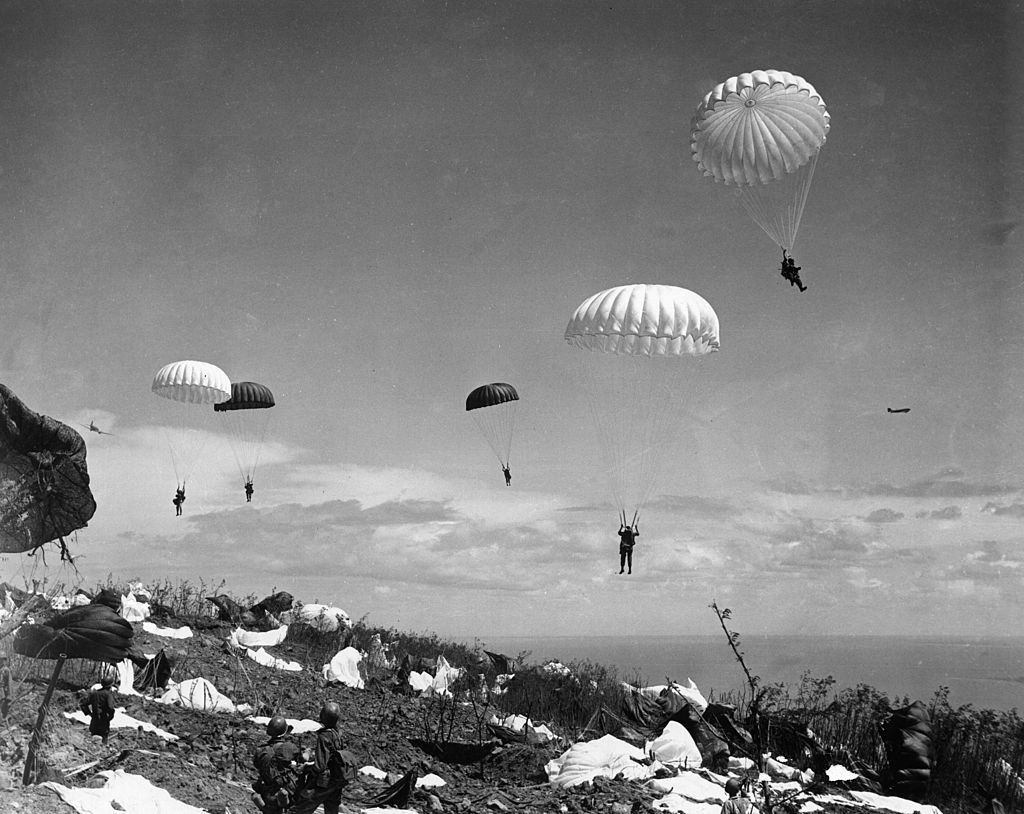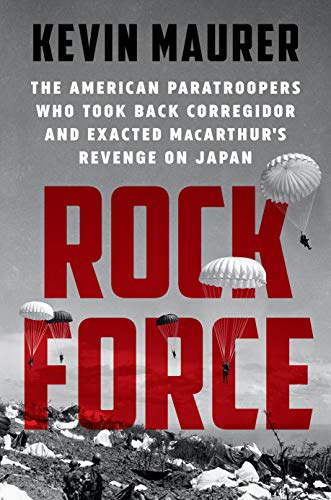
Soldiers know the stories the rest of us want to hear. Some even have one or two. Anthony Lopez had one that I eventually got him to tell me. It was February 1945, and Lopez was a young private in the 503rd Parachute Infantry Regiment. The day before, he and more than 3,000 American paratroopers had dropped on Corregidor, a three-mile-wide, tadpole-shaped island fortress at the mouth of Manila Bay. It was ground that General Douglas MacArthur had been forced to abandon three years before, and now American forces were determined to take it back.
Lopez was perched on the top edge of a ravine that plunged down to the sea, his eyes scanning rough terrain that crawled with Japanese soldiers. He spotted a bloody soldier below waving his arms; before anyone could aim, Lopez shouted out that the man wore an American uniform.
The paratroopers sent a rescue party to the wounded man, only to watch it get shot up by a Japanese ambush. Undaunted, Lopez put down his weapon and clambered over the lip of the ridge with a friend. Lugging a bedspring, they slid down the steep ravine and into the brush, slowly working their way toward their wounded comrade. When they reached him, they helped him onto the bedspring and headed back to safety. Bullets ricocheted off the rocks and kicked up the dirt. Lopez felt something bite into his left hip and burn. Adrenaline shot through his body and he was able to get to safety. A medic met Lopez at the top of the ravine. He wrapped his hip with two white pads and sprinkled some sulfa powder over the wound to ward off infection. But by nightfall, the wound became infected anyway, and Lopez passed out. Medics evacuated him off the island. He was lucky, though. The soldier Lopez had nearly given his life to save died before he reached the aid station.
I met Lopez while working on a book about World War II called Rock Force, which chronicles the second battle for Corregidor. By then, Lopez was an old man, the war of his youth considered almost ancient history. But the more I talked with Lopez, the more I saw of that young man he had once been. I saw in him what I’ve seen from soldiers in more recent wars, like Iraq and Afghanistan. And one of those constants lies in the stories they tell: While the world may demand tales of the terror of combat, those are better left in the past. To the men who lived them, the best stories happened in the quiet moments—especially if they ended with a laugh.
Ernie Pyle was the best war correspondent in World War II. He represented the voice of the soldier. In the days leading up to my first trip to Iraq in 2003, I read Pyle’s columns hoping I, too, could at least capture the voice of the soldier. He had a knack for cutting through the fluff and getting to the heart of it. Like Pyle, my interest was never on the men giving orders, but the ones carrying them out. For six weeks in 2003, as I followed the 82nd Airborne from Kuwait City to Baghdad, I did my best to bring the voice and stories of the soldier to the pages of the local paper where I worked in North Carolina. Most of soldiers in Iraq and Afghanistan just wanted to do their job and protect the people to their left and right. No one—and I can’t stress this enough, no one—considered himself a hero. Soldiers only used that word to describe others. And when it was time to talk about their service, they wanted to laugh. They wanted to talk about the funny or strange stuff they experienced. These stories brought back a sense of being part of something bigger than themselves, I think, and the power of sharing such a visceral an experience with others.
“It would be wrong to say that war is all grim; if it were, the human spirit could not survive two and three and four years of it,” Pyle wrote about his experience with soldiers, adding, “As some soldier once said, the Army is good for one ridiculous laugh per minute. Our soldiers are still just as roughly good-humored as they always were, and they laugh easily, although there isn’t as much to laugh about as there used to be.”
Get your history fix in one place: sign up for the weekly TIME History newsletter
This quote works then and now. Guys are quick to tell me about accidentally crapping in their pants at night because they couldn’t use a flashlight to see where the slit trench was. One of my favorite stories was about a bunch of specialists in the 325th Parachute Infantry Regiment in 2003 who hotwired a train engine in Southern Iraq because they were bored. I can still see the shocked faces of the sergeants and platoon leaders—who I think believed they’d never get it started—when the engine roared. The funny part was, even months later when I went back to embed with the unit in Baghdad, some of the paratroopers were still talking about how the 325th tried to take Thomas the Tank Engine to Baghdad. By then, the story had the train moving down the track.
And so, it wasn’t surprising that, when I met Lopez in 2018 at his home in Denver to interview him about Corregidor, he didn’t want to talk about the ravine. He wasn’t a hero in his mind, even in that story.
“I have been called a hero many times,” Lopez wrote in a short memoir of his time in the 503rd. “But I tell them, I am not a hero. I went through World War II and had my wounds, but I came home. I married, raised a family and lived a full life. My heroes are my friends and brothers who, at the age of eighteen, nineteen and twenty years old never had that opportunity… Those that never came home, never saw their families or friends, those, in my opinion, are the true heroes.”
Instead, Lopez wanted to talk about his friends and the funny stuff, like how the paratroopers used to steal trucks and supplies. He told me he used stolen supplies to make apple pies at the paratroopers’ base camp. That made him a hero to his buddies more than going into the ravine did.
Before I left, he made sure to tell me a story about a brace of .38 revolvers he had received in exchange for a brass‐knuckle trench knife. Lopez was on his way to relieve a buddy on guard duty when his friend Charlie Stewart picked up the revolvers and started to twirl them like the Hollywood cowboys.
“Careful,” Lopez said. “They’ve got a hair trigger.”
Stewart laughed off the warning. “That’s OK because I’m a cowboy at heart.”
Seconds later, as Stewart went to spin one of the revolvers into the holster on his belt, the gun went off. The bullet hit Stewart in the right calf. Lopez shook his head and took the guns away.
“See,” he said. “And you won’t even get a Purple Heart.”
Lopez barely finished the story because he was still chuckling. It was clear to me that he was 70 years in the past, a young man back in his tent in the Philippines, watching his friend hop around in pain. This kind of dark humor covered everything, especially when the person in pain did it to themselves. Nothing is sacred. I’ve even heard the Purple Heart—awarded to soldiers wounded or killed in combat—jokingly referred to as the “enemy marksmanship medal.”
So, when you talk to a veteran today, don’t just ask them about combat or where they were deployed. Don’t just call them a hero or thank them for their service. Ask them to tell you one story they always bring up with their unit mates, and then watch them try to tell it through tears of laughter.

Kevin Maurer is the author of Rock Force: The American Paratroopers Who Took Back Corregidor and Exacted Macarthur’s Revenge on Japan, available Dec. 1 from Dutton Caliber.
More Must-Reads From TIME
- The 100 Most Influential People of 2024
- Coco Gauff Is Playing for Herself Now
- Scenes From Pro-Palestinian Encampments Across U.S. Universities
- 6 Compliments That Land Every Time
- If You're Dating Right Now , You're Brave: Column
- The AI That Could Heal a Divided Internet
- Fallout Is a Brilliant Model for the Future of Video Game Adaptations
- Want Weekly Recs on What to Watch, Read, and More? Sign Up for Worth Your Time
Contact us at letters@time.com